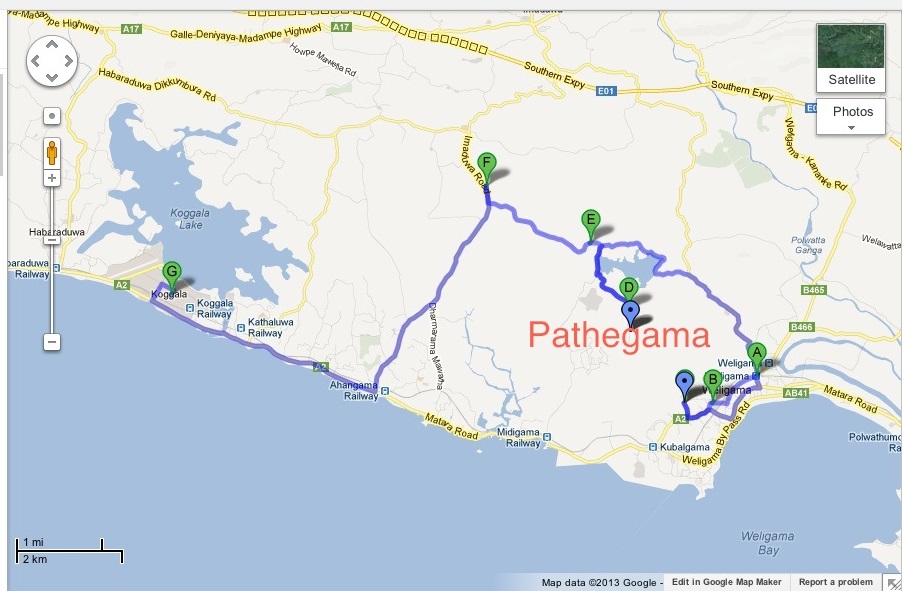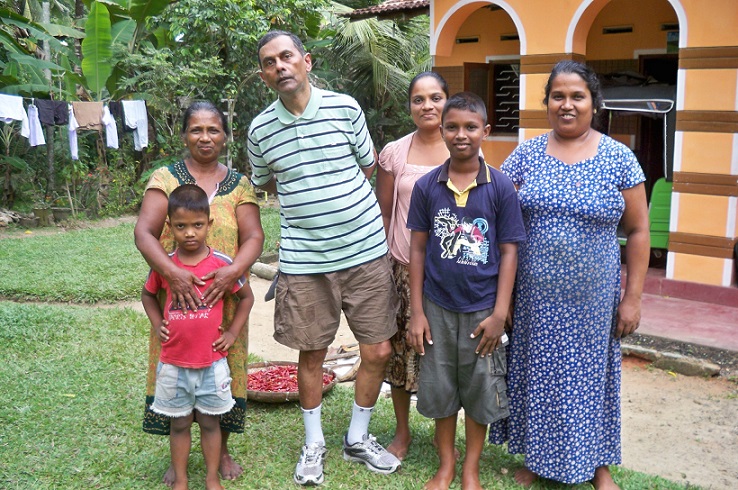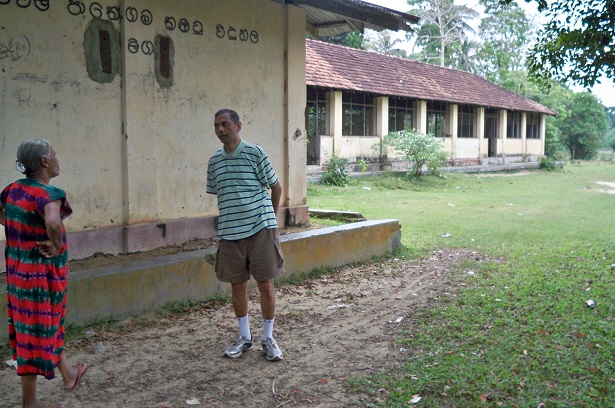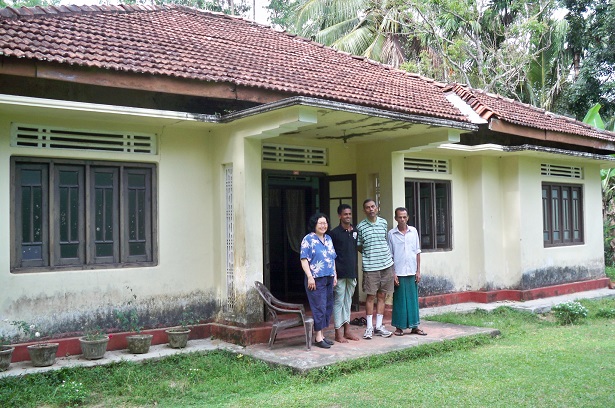Travels of a journalist [2013 Series #4] – Eastward Ho from ‘Home Sweet Home’ to Weligama Bay
Posted on June 9th, 2013
By Shelton Gunaratne, author of From Village Boy to Global Citizen, Vol. 1: The Journey of a Journalist; and Vol. 2: The Travels of a Journalist (Bloomington, IN: Xlibris)
WeƒÆ’‚¢ƒ¢-¡‚¬ƒ¢¢”š¬‚my spouse Yoke-Sim and IƒÆ’‚¢ƒ¢-¡‚¬ƒ¢¢”š¬‚gave top priority to visiting my birth village of Pathegama, a couple kilometers west of Weligama, on my tour of the Deep South early April. We left the Koggala folk culture museum in the early afternoon to enter our village unannounced from the backdoor through Panchaliya.
Our driver, Amal Chandrakumara, consulted the locals on how best to reach Pathegama. We left the coastal highway at the Ahangama junction, drove north on the Imaduwa Road and then east on the Panchaliya-Borala Road. [On the map, follow the backdoor route to Pathegama linking G, F, E and D. Google has dropped the Batawala-Pathegama Road that should link the unidentified points D and C, the western terminus of the Agra Bodhi Vihara Mawatha. The Panchaliya-Borala Road, E, runs directly to the Weligama city center, A.]
Shortly, we stopped at a junction for further inquiries. To our surprise, we found that we had already reached Pathegama. Furthermore, we learned that we could reach Mederikoratuwa, my fatherƒÆ’‚¢ƒ¢-¡‚¬ƒ¢-¾‚¢s ancestral home, by turning left at the junction.
[My previous visit to Pathegama was 22 years ago in 1991 in the company of my mother, my younger sister Nayana and my 11-year old son Junius Asela. Chapter 17 of Vol. 1 of my autobiography, The Journey of a Journalist, describes that visit.]
In my childhood, the gravel road that took us to the back of Mederikoratuwa was informally called the Kitulegodawatta Road. The name came from the large rubber plantation in the vicinity.
My thoughts flashed back to my childhood bringing memories of visiting the home of the plantationƒÆ’‚¢ƒ¢-¡‚¬ƒ¢-¾‚¢s conductor, whom the villagers called Kondostara Mahattaya, in the company of my father. On one occasion, the English-educated conductor dressed in trousers entertained us with melodious gramophone music sung by the fabulous Rukmani Devi. ƒÆ’-¡ƒ”š‚ Now, the plantation had replaced rubber with tea. I had a nostalgic longing for the smell of ottapalu (latex) that pervaded the area surrounding the estate. I donƒÆ’‚¢ƒ¢-¡‚¬ƒ¢-¾‚¢t think I missed the ottapalu smell that much on my previous visit to Pathegama.
Even after driving well into the gravel road, I could not recall which of the homes was the property of my paternal grandfather because the residents had planted bush fences to cover their backyards from the view of passers-by. We stopped the vehicle at the first sight of an opening to our right.
ƒÆ’-¡ƒ”š‚ ƒÆ’‚¢ƒ¢-¡‚¬ƒ…-Do you know where Sudu Mahattaya (Richard) lives?ƒÆ’‚¢ƒ¢-¡‚¬ƒ”š‚ I asked a bare-chested sarong- clad man who was hesitantly moving away from the fence down the sloping terrain without an answer. Then, I told him, ƒÆ’‚¢ƒ¢-¡‚¬ƒ…-I am Shelton Gunaratne visiting from America.ƒÆ’‚¢ƒ¢-¡‚¬ƒ”š‚
He reluctantly smiled after recognizing that I was one of his cousinsƒÆ’‚¢ƒ¢-¡‚¬ƒ¢¢”š¬‚the older son of the postmaster (Thepal Mahattaya), the second younger brother of RichardƒÆ’‚¢ƒ¢-¡‚¬ƒ¢-¾‚¢s father.
He promptly invited us to his home and offered us some rice with curried brinjals (eggplants) if we were hungry. He was the only one at home with his wife gone to Colombo on an errand. He recalled that I had lunch with his family on my last visit tooƒÆ’‚¢ƒ¢-¡‚¬ƒ¢¢”š¬‚more than two decades ago.
Richard took us to see the grave of his older brother, Kalu Mahattaya (Francis), an attorney-at-lawƒÆ’‚¢ƒ¢-¡‚¬ƒ¢¢”š¬‚the pride of his family.ƒÆ’-¡ƒ”š‚ Francis was a contemporary of mine at the Peradeniya campus of the University of Ceylon.
The old ancestral home of Mederikoratuwa had been demolished years ago. Punchy Appuhamy, 81, an ƒÆ’‚¢ƒ¢-¡‚¬ƒ…-adopted sonƒÆ’‚¢ƒ¢-¡‚¬ƒ”š‚ of my paternal grandparents, and his wife Kalu Nona now occupied the house built behind the old ancestral home. The well-to-do family of their daughter lived in a two-story house built next door. We were impressed that their youngsters were deep into miniature digital gadgets.
A land dispute between Sudu Mahattaya and Punchy Appuhamy had soured the relations between these two families. Although I too was a part owner of the property, I said they should settle their differences by mutual agreement than through legal recourse.
I went to see Punchy Appuhamy, now wheel chair bound, to pay my respects. Kalu Nona joked with me about my shyness in my childhood. Their older daughter insisted that we visit their two-story home for afternoon tea.
The writer (second from left) appears with Kalu Nona (left) and her progeny.
After enjoying the hospitality of the three families, we had to leave Mederikoratuwa to visit my maternal ancestral home, where I was born, a few kilometers further east at Habaradugewatte. Richard volunteered to show us the way.
But before getting there, we stopped at the site of the Batawala-Pathegama primary school, which I first attended as a kid. It was this schoolƒÆ’‚¢ƒ¢-¡‚¬ƒ¢-¾‚¢s headmaster (Palaveni Mahattaya) who first read the Sinhala alphabet to me at age 3. Now the school stood closed although the main building remained intact. Vanished was the house that the headmasterƒÆ’‚¢ƒ¢-¡‚¬ƒ¢-¾‚¢s family lived. I wondered about the fate of the car he ownedƒÆ’‚¢ƒ¢-¡‚¬ƒ¢¢”š¬‚the only automobile the village then had.
Meanwhile, word had got around about my arrival, and a few curious people gathered around me to touch me as if to see I was real. As I was pressed for time, I was unable to accept their requests to visit all the kith and kin nearby.ƒÆ’-¡ƒ”š‚ I gathered that all the characters I had featured in my ƒÆ’‚¢ƒ¢-¡‚¬ƒ…-Village SketchesƒÆ’‚¢ƒ¢-¡‚¬ƒ”š‚ were now deadƒÆ’‚¢ƒ¢-¡‚¬ƒ¢¢”š¬‚Myna Ralahamy, Singappuru Basunnehe, Bus Mahatun, Nondi Baby, Lindagahawatte Gunapala, Weligama Hamine, et alƒÆ’‚¢ƒ¢-¡‚¬ƒ¢¢”š¬‚who lived in the vicinity of the school. Some of them had departed well before my last visit.ƒÆ’-¡ƒ”š‚
The writer visited the site of his primary school, now closed down. The woman (left), whom he recognized as a relative of Myna Ralahamy, was one of those villagers who wanted to touch him.
Our last stop in the village was our Maha Gedera (ancestral home) where all of the five siblings in my family were born. It was the spot from where my grandfather, the imperious Ralahamy, ruled the roost over Pathegama in the 1940s. ƒÆ’-¡ƒ”š‚ On our last visit, Ukkun Maama and his wife, who had purchased the house, welcomed us. After their death, their children inherited the property. The current occupants were the family of their youngest son. On this occasion, the new occupants were apparently unhappy that we chose to visit Mederikoratuwa first. ƒÆ’-¡ƒ”š‚
At the house where the writer (second from right) was born, he poses with his wife (left), the current occupant of the place (second from left) and Sudu Mahattaya (Richard).
However, I managed to take a good look at our old bedrooms, grandfatherƒÆ’‚¢ƒ¢-¡‚¬ƒ¢-¾‚¢s room, kitchen and the backyard. The building was still in good shape. The entire property seemed to have shrunk in size in my imagination. For me, it was still ƒÆ’‚¢ƒ¢-¡‚¬ƒ…-Home Sweet Home.ƒÆ’‚¢ƒ¢-¡‚¬ƒ”š‚ The landscape of the village had undergone a change that I found it difficult to identify places that used to be familiar. My grandfatherƒÆ’‚¢ƒ¢-¡‚¬ƒ¢-¾‚¢s grave was still visible from a distance.
We had no time even to pay a short visit to adjoining Habaradugewatte. ƒÆ’-¡ƒ”š‚ As was the custom in the Alut Avurudda (New Year) season, we gave our hosts a financial gift in return for their hospitality, and continued our trip eastward to the town of Weligama via Batawala Junction and Kushtarajagala.
Weligama town was agog with shoppers in the gloaming when we arrived there. Richard guided us along the Borala Road to the home of another cousin of ours, Gamini Gunaratne (whom I used to call Mederikoratuwa Malli), the son of my fatherƒÆ’‚¢ƒ¢-¡‚¬ƒ¢-¾‚¢s second oldest brother who retired as a headmaster. Gamini and his older sister Grace grew up in Mederikoratuwa, where their mother, Galle Hamine, occupied the ancestral home.
Gamini, who had retired from his job as a public health inspector, was not at home for almost an hour after our arrival. We felt we had caused them inconvenience by our unannounced visit although they were aware of our visit to Sri Lanka. His wife and his daughter treated us for evening tea until GaminiƒÆ’‚¢ƒ¢-¡‚¬ƒ¢-¾‚¢s belated arrival as we were about ready to leave. Being a quiet person, Gamini himself was unable to keep the conversation going.
So, we took leave of them after handing them our Alut Avurudda gift, which they reluctantly accepted. After driving back to Pathegama to drop off Sudu Mahattaya (Richard), we drove further east to Palena, on the edge of Weligama, to spend the night at the Bay Shine Motel on the coastal highway to Matara. Before we checked in, we shared a hearty dinner with our driver at the motel restaurant.
We got up early Tuesday morning to resume our tour eastward. The elderly man who checked us out confided that he was related to Myna Ralahamy of Pathegama. He did not elaborate, and I did not ask for details.
(Courtesy: SundayTimes.lk)
Matara Brings Memories of Good Old Fifties]
ƒÆ’-¡ƒ”š‚




June 14th, 2013 at 12:32 am
Nostalgia! Your “home coming” diary awakens me to things that have made me happy in my life half a century ago in a village same as yours and closer to yours.
It reminds me the times we used to enjoy running around paddy fields, among the bushes in the hills where Himbatu, Maadan, Kadju were in plenty and coming home with purple mouths.
No meal can beat WEDAMA taken at paddy fields on Banana Leaves along with people who tilled the fields or a lunch served after a Dana at home. KARAWALA BEDUMA & KIRIHODI is still mouthwatering than best Russian Caviar. All these delights are out of my reach now, A simple twist of fate!
I still remember vividly that one afternoon during the New Year season almost 60 years ago. We were playing in our Meda Midula. The smell of new clothes were still fresh.
A car came in and it was relatives visiting us for the New Year. One young gentleman came with, in his early twenties I believe, proceeds straight to our Istoppuwa or verandah and relaxed at the Hansiputuwa, the most comfortable chair there. He was smiling alone, his thoughts were somewhere else, and resting his head on the very slanted back of the chair. The diamond patterned cane surface seems comfortable for him. One of his legs rest on one of the long arms of the chair that was spread out in front of the chair.
We didn’t go closer to him but watched from outside through the opening like a window on the wall, hanging on to the wall. We were just tall enough to keep our heads high enough to see through the window.
His mother and mine look at him through the door curtain taking care not to be noticed by him. ‘It is university holidays now’ she whispers to my mother with a faint but proud smile.
The young gentlemen as far as I could remember did not eat anything though there were enough Kokis Kavum etc. He just had a cup of tea. After about an hour they left. That was the first and last time I ever saw him. And that young gentleman I believe was you almost 60 years ago.
I am from Borala. My father was the Village Headman. He and Thapal Mama were close. We used to go the Weligama Post Office Post Master Quarters. Aunty was then well built and used to have long conversations with our amma especially after we lost our farther. Every month she used to go to post office to collect her pension, she never waited in line, but waited at the PM Quarters chatting with Aunty. And Uncle used to bring the cash there.
The matchmaker or the Kapuwa of my parents was Thapal Uncle’s brother, The Headmaster or the father of Gamini & Grace. It seems that he used to teach at a school in Urubokka area where he came to know my mother’s family.
I do remember very well the day they came to our home after the Headmaster uncle was transferred to a School in Palalla. Gamini was so sick after a long journey from Mountainous Deniyaya he walked out several times to throw up.
After we lost our father they helped us so much. I was just 12 then. Below me were 5 more siblings. That Aunty was like a second mother. I saw Colombo for the first time when that uncle took me and another close relative on a Colombo tour when I was in primary school. And on that trip, we spent a night at your home at Mt. Lavinia, I believe.
I went back through most of your columns at Lanka web. I learned about your mother’s passing away in one of those columns. It is good to learn to that she had long and happy life.
I didn’t plan to write this long. But couldn’t stop once started.
I wish your wife and you many wonderful journeys for many years to come! And best regards to Asoka & Kanthi.
Wimal
P. S.
I’ve been living & working in Japan for the last 27 years with my japanese wife.
June 16th, 2013 at 7:39 am
Thanks very much for your nostalgic look at the past.
I can remember well the occasional visits we made to Borala through the backdoor route called the Panchalliya-Borala Road.
But the name Wimal does not ring a bell to me. I am keen to know much more about you and your siblings. Had I known about their whereabouts, I would have dropped by their “home sweet home” to say “hellow.”